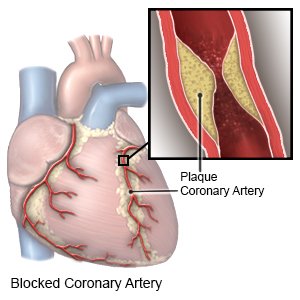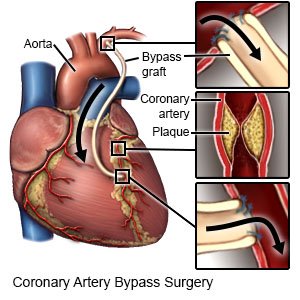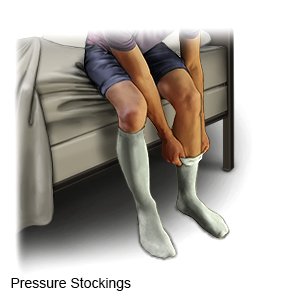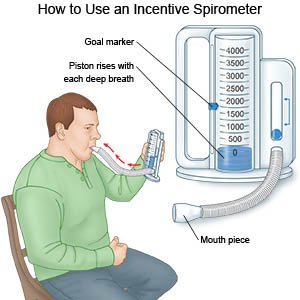CABG (Coronary Artery Bypass Graft)
Medically reviewed by Drugs.com. Last updated on Aug 4, 2025.
AMBULATORY CARE:
What you need to know about coronary artery bypass graft (CABG) surgery:
A CABG is open heart surgery to clear blocked arteries in your heart. CABG surgery improves blood flow to your heart by bypassing (sending blood around) the blocked part of an artery. This restores blood flow to your heart and helps prevent a heart attack.
 |
How to prepare for CABG surgery:
- Your surgeon will talk to you about how to prepare for surgery. He or she may tell you not to eat or drink anything after midnight on the day of your surgery. Arrange to have someone drive you home after you are discharged.
- Tell your surgeon about all your current medicines. He or she will tell you if you need to stop any medicine for surgery, and when to stop. He or she will tell you which medicines to take or not take on the day of surgery.
- You may be able to donate your own blood before surgery. This is called autologous blood donation. You may also ask a family member or friend with the same blood type to donate blood for you. This is called directed blood donation.
- Tell your surgeon about any allergies you have, including to medicines or anesthesia.
What will happen during CABG surgery:
 |
- You will be given general anesthesia to keep you asleep and free from pain during surgery. Your surgeon will make an incision in your chest. He or she will cut or spread your ribcage apart to reach your heart. He or she may safely slow your heartbeat to attach the graft. Your heart may be connected to a bypass machine. This machine pumps blood to your body and keeps blood out of your heart during surgery.
- Your surgeon will make a separate incision to remove the graft. The graft is a piece of healthy blood vessel taken from somewhere else in your body, such as your leg. He or she will sew the graft vessel to your artery above and below the block. This allows blood to flow around the blocked area to your heart muscle. After surgery, the blood will be allowed to flow through your heart. Your surgeon will close the incision where the graft came from with stitches and cover it with bandages. Your chest incision will be closed. A bandage will cover your incisions to keep the area clean and dry to prevent infection.
What to expect after CABG surgery:
- A chest tube is placed during surgery to drain air and extra fluid from around your lungs. This allows your lungs and heart to work properly. The chest tube is attached to a container. Call a healthcare provider right away if the tube comes apart from the container. Let the provider know if the tubing gets bent, twisted, or the tape comes loose. The chest tube may be removed 24 to 48 hours after surgery. Your provider will monitor how much fluid collects and decide when to remove it.
- A Foley catheter is a tube put into your bladder to drain urine into a bag. Keep the bag below your waist. This will prevent urine from flowing back into your bladder and causing an infection or other problems. Also, keep the tube free of kinks so the urine will drain properly. Do not pull on the catheter. This can cause pain and bleeding, and may cause the catheter to come out.
- Extra oxygen may be needed if your blood oxygen level is lower than it should be. You may get oxygen through a mask placed over your nose and mouth or through small tubes placed in your nostrils. Ask your healthcare provider before you take off the mask or oxygen tubing.
- You may need to wear pressure stockings or inflatable boots after surgery. The stockings are tight and put pressure on your legs. The boots have an air pump that tightens and loosens different areas of the boots. Both of these improve blood flow and help prevent clots.

- You may not be able to do your normal activities for a few months. Your sternum (breastbone) will need time to heal. For 6 to 8 weeks after surgery, you will need to follow your healthcare provider's activity instructions.
Recovery from surgery:
- Deep breathing and coughing will decrease your risk for a lung infection. Take a deep breath and hold it for as long as you can. Let the air out and then cough strongly. Deep breaths help open your airway. You may be given an incentive spirometer to help you take deep breaths. Put the plastic piece in your mouth and take a slow, deep breath. Then let the air out and cough. Repeat these steps 10 times every hour.

- You may need to walk around the same day of surgery , or the day after. Movement will help prevent blood clots. You may also be given exercises to do in bed. Do not get out of bed on your own until your healthcare provider says you can. Talk to healthcare providers before you get up the first time. They may need to help you stand up safely. When you are able to get up on your own, sit or lie down right away if you feel weak or dizzy. Then press the call light button to let healthcare providers know you need help.
- You will be able to drink liquids and eat certain foods when your stomach function returns after surgery. You may be given ice chips at first. Then you will get liquids such as water, broth, juice, and clear soft drinks. If your stomach does not become upset, you may then be given soft foods, such as ice cream and applesauce. When you can eat soft foods easily, you may slowly begin to eat solid foods.
Risks of CABG surgery:
- You may develop an infection. You may bleed more than expected and need a blood transfusion. You may have fast, irregular heartbeats. Your heart may not get enough oxygen and have trouble pumping blood through your body after surgery. Your signs and symptoms may come back. You may need another CABG.
- You may have fluid buildup around your heart. This fluid puts pressure on the heart and prevents it from working properly. You may also have fluid buildup around your lungs. This may make it hard for you to breathe after surgery. You may get a blood clot in your leg or arm. These problems can be life-threatening.
Call your local emergency number (911 in the US) or have someone call if:
- You feel lightheaded, short of breath, and have chest pain.
- You cough up blood.
- You have a fast heartbeat that flutters.
- You feel like you are going to faint.
Seek care immediately if:
- Your arm or leg feels warm, tender, and painful. It may look swollen and red.
- You have numbness or tingling in your arms or legs.
- You have a severe headache.
- You have a fever higher than 101°F (38.4°C).
Related medications
Call your doctor if:
- You have gained 2 pounds in 24 hours.
- Your wound is red, swollen, or draining pus.
- You feel depressed.
- You have questions or concerns about your condition or care.
Medicines:
You may need any of the following:
- Prescription pain medicine may be given. Ask your healthcare provider how to take this medicine safely. Some prescription pain medicines contain acetaminophen. Do not take other medicines that contain acetaminophen without talking to your healthcare provider. Too much acetaminophen may cause liver damage. Prescription pain medicine may cause constipation. Ask your healthcare provider how to prevent or treat constipation.
- Antiplatelets , such as aspirin, help prevent blood clots. Take your antiplatelet medicine exactly as directed. These medicines make it more likely for you to bleed or bruise. If you are told to take aspirin, do not take acetaminophen or ibuprofen instead.
- Cholesterol medicine helps lower cholesterol and lipid levels in your blood.
- Antibiotics help prevent a bacterial infection.
- Heart medicine helps strengthen and regulate your heartbeat.
- Blood pressure medicine helps lower or control your blood pressure.
Go to cardiac rehabilitation (rehab) as directed:
Cardiac rehab is a program run by specialists who will help you safely strengthen your heart and prevent more heart disease. This plan includes exercise, relaxation, stress management, and heart-healthy nutrition. Healthcare providers will also check to make sure any medicines you take are working. The plan may also include instructions for when you can drive, return to work, and do other normal daily activities.
Activity:
Your healthcare provider will give you specific activity instructions. The following are general guidelines to follow for up to 8 weeks after surgery:
- Protect your sternum. Hug a pillow to your chest or cross your arms over your chest when you laugh, sneeze, or cough.
- Be careful when you get into or out of a chair or bed. Hug a pillow or cross your arms when you stand or sit. Do not twist as you move. Use only your legs to sit and stand. You may need to use a raised toilet seat if you have trouble standing up without using your arms. Your healthcare provider may teach you to use your elbow for support as you move from lying to sitting.
- Do not lift anything heavier than 5 pounds until your healthcare provider says it is okay. For example, a gallon of milk weighs 8 pounds.
- Do not play sports that use your shoulder. Examples include tennis and golf.
- Do not drive until your healthcare provider says it is okay.
- Keep your arms down as much as possible. Do not put your arms out to the side, behind you, or over your head. Do not let anyone pull your arms to help you move or dress. Do not reach for items.
- Do not push or pull anything. Examples include a car door or a vacuum cleaner.
Care for your surgery area as directed:
Carefully wash around the area with soap and water. Let the soap and water run over the area. Do not scrub the area. If you do not have a bandage, gently pat the area dry with a clean towel. If you have a bandage, dry the area and put on a new, clean bandage. Change your bandage if it gets wet or dirty.
Prevent another blocked artery:
- Manage other health conditions. Diabetes and high cholesterol increase your risk for a heart attack and stroke. Talk to your healthcare provider about your management plan. He or she will make a plan that helps you manage your conditions.
- Eat heart-healthy foods. You may need to eat foods that are low in salt, fat, or cholesterol. Healthy foods include fruits, vegetables, whole-grain breads, low-fat dairy products, beans, lean meats, and fish. Ask your healthcare provider for more information about a heart healthy diet.

- Do not smoke. Nicotine and other chemicals in cigarettes and cigars can cause heart and lung damage. Ask your healthcare provider for information if you currently smoke and need help to quit. E-cigarettes or smokeless tobacco still contain nicotine. Talk to your healthcare provider before you use these products.
- Maintain a healthy weight. Ask your healthcare provider what a healthy weight is for you. Extra weight can increase the stress on your heart. Ask him or her to help you create a safe weight loss plan if needed.
Ask about vaccines you may need:
Vaccines help prevent diseases that can be dangerous for a person who has heart disease. Ask your healthcare provider about these and other vaccines you may need:
- Get a flu vaccine as soon as recommended each year, usually starting in September or October.
- Ask your healthcare provider about the pneumonia vaccine. The vaccine is recommended for all adults aged 50 or older to prevent pneumococcal disease, such as pneumonia. Adults aged 19 to 49 years who are at high risk for pneumococcal disease should also receive the vaccine. You may need 1 dose or 2. The number depends on the vaccine used and your risk factors.
- COVID-19 vaccines are given to adults as a shot. At least 1 dose of an updated vaccine is recommended for all adults. COVID-19 vaccines are updated throughout the year. Adults 65 or older need a second dose of updated vaccine at least 4 months after the first dose. Your healthcare provider can help you schedule all needed doses as updated vaccines become available.
Follow up with your doctor or cardiologist as directed:
You may need to go in regularly for tests to check how your heart is doing. Write down your questions so you remember to ask them during your visits.
© Copyright Merative 2025 Information is for End User's use only and may not be sold, redistributed or otherwise used for commercial purposes.
The above information is an educational aid only. It is not intended as medical advice for individual conditions or treatments. Talk to your doctor, nurse or pharmacist before following any medical regimen to see if it is safe and effective for you.
Further information
Always consult your healthcare provider to ensure the information displayed on this page applies to your personal circumstances.
